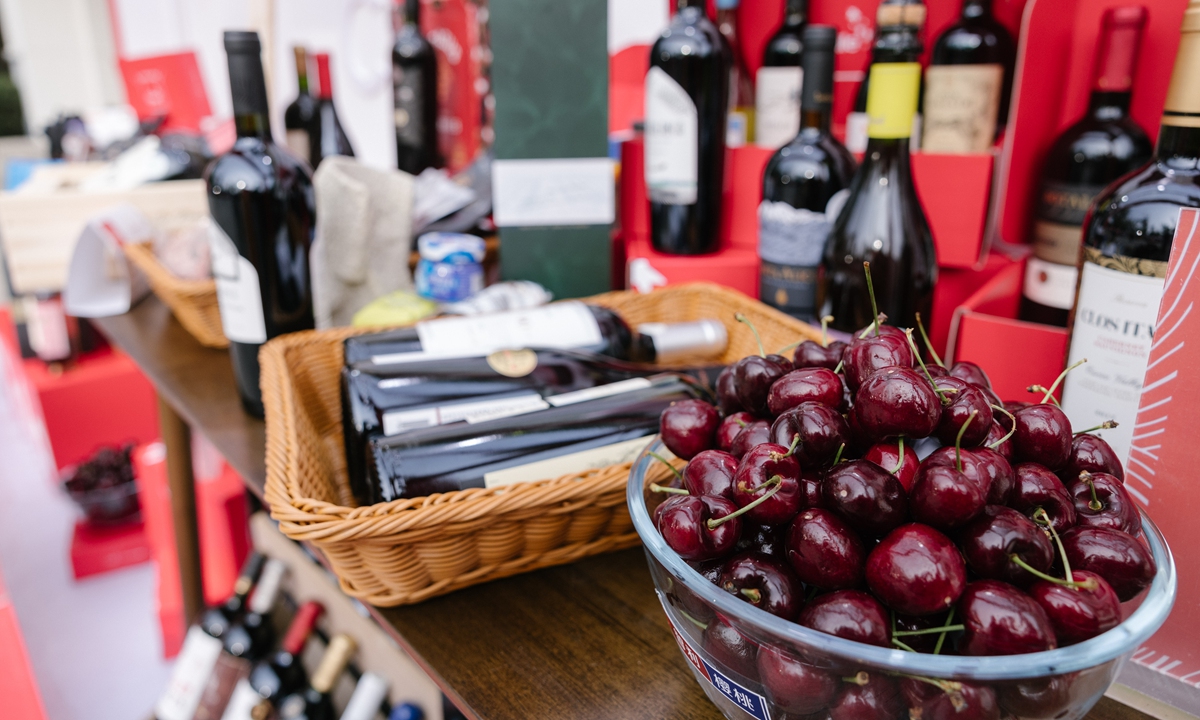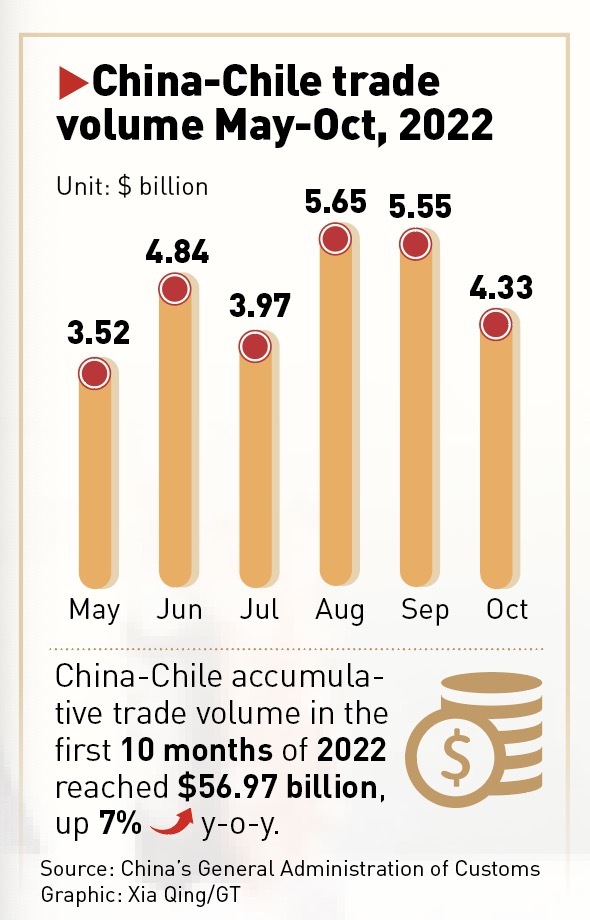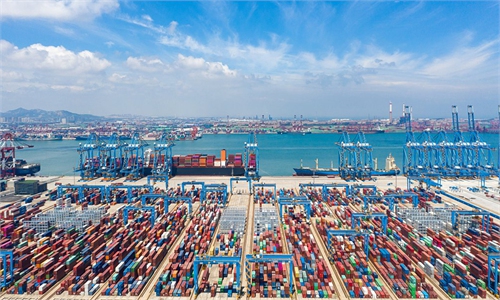Chilean cherries, salmon, wine trade embarks on an upward trajectory in Chinese market, modeling win-win cooperation between developing countries
Fruits and fishes embark on an upward trajectory from free trade

Chilean food is displayed during the Chile Week held in Beijing on Tuesday. Photo: Li Hao/GT
Chile Week, the largest promotional event of the Chilean products in China, celebrated its seventh edition at the Chilean Embassy in Beijing on Tuesday, an important milestone for bilateral trade ties, which have blossomed under the two-way Free Trade Agreement (FTA), the first of its kind between China and a Latin-American country, combined with the comprehensive strategic partnership between the two countries.The eight-day event, which will be held in Beijing, Chengdu, Shanghai and Shenzhen, is designed to provide business opportunities for companies of the two sides to review old partnerships while seeking new ones. More than 200 guests attended the opening of the event including Chilean companies in the Chinese market, representatives of industry associations, importers, and media.
"Chile Week is our best promotional event in China, which we have done already for seven years. Aside from promoting companies that already present in the market, we want to explore new opportunities of cooperation with China," Natalia Cortes, director of the Commercial Office of the Chilean Embassy in Beijing, told the Global Times on Tuesday.
The promotional week came less a week after the head of states between China and Chile met in Thailand at the 29th Asia-Pacific Economic Cooperation Economic Leaders' Meeting on November 18, during which Chinese President Xi Jinping said that "China is ready to join Chile in pushing for further development of their comprehensive strategic partnership," Xinhua News Agency reported.
For more than half a century, the China-Chile relationship has been a pioneer in China's relations with Latin American and Caribbean countries, setting a prime example for win-win cooperation between developing countries, and should be cherished, Xi said.
Serving as a model of win-win cooperation, the bilateral relations, which have stood the test of time, have gone from strength to strength, exemplified by the positive trend of trade volume and categories, despite the epidemic, high inflation and geopolitical conflicts.
In 2021, the total trade volume between China and Chile reached $65.81 billion, a year-on-year increase of 51.6 percent, data from China's General Administration of Customs revealed.
The growth has continued this year. From January to October, bilateral trade amounted $56.97 billion, a year-on-year increase of seven percent, of which, Chilean exports to China rose 16.6 percent year-on-year.
Niu Qingbao, Chinese Ambassador to Chile, said at the opening of the Chile Week on Tuesday via video link that China-Chile economic and trade cooperation has continued to grow strongly, and has become a bright spot against the backdrop of weak global economic recovery.
"Some people see the slowdown of China's economic development and worry about the prospects of China-Chile economic and trade relations. Such worries are unnecessary," Niu said.

Diplomats and staff from Chilean Embassy in Beijing Photo: Li Hao/GT
'FTA opens up the possibility'As the first Latin-American country to sign an FTA with China, which came into effect in 2006, Chile has been a pioneer in the region, offering experience to Latin American countries to tap into China's sizeable consumer market.
The two countries' upgraded FTA agreement, which came into force on March 1, 2019, means that 98 percent of all goods traded are tariff free, with the China-Chile Free Trade Zone becoming China's free trade zone with the highest level of open trade.
"It's been very astonishing...since from then on, the imports to China have grown on average of around 15 percent yearly overall, and the number of companies participated in the Chinese market has also tripled," Cortes said, addressing the achievements of the trade under the free trade agreement.
"We have started being the timid exporter of some products like fruits and meat to a great category of goods in the market...we are the number one fresh fruit supplier to China, and we are the second exporter in wine, and also the top exporter of salmon. The FTA has opened up the possibility for that," Cortes said.
China's resilient market which places a premium on quality foods has helped Chilean products achieve a strong foothold despite the epidemic.
Nicolas Terrazas, managing director of Blumar Seafoods, whose company participated at this year's Chile Week, told the Global Times that although the business is not yet at the levels before the epidemic, it has certainly recovered this year.
"Our company imports about 1,000 tons of frozen salmon from Chile this year compared with around 600 tons last year," Terrazas said. The tariff exemption under the FTA has played its part in buoying the recovery.
In addition to salmon, Terrazas' company is looking at the potential of mackerel in the Chinese market, a relatively new delicacy compared with salmon.
"Mackerel is very popular in countries including Japan while China has a lot of seafood industrial chain, especially up north. So many processors in China will process mackerel from Chile before re-exporting it to other markets such as Japan and even European countries," Terrazas said.
The company expects to export 800 tons of mackerel to China this year, and at least double that amount next year.
Wine business has also benefitted in the uplift in two-way trade. Wang Zaidong, marketing manager of a subsidiary of Changyu, told the Global Times that Chilean red wine has great potential in the Chinese market, both in terms of taste and price.
After the anti-dumping tariffs were placed on Australian wine, Chilean wine has enjoyed a rise in popularity in China, and now holds a market share only second to French wine, industry insiders claimed.
The company bought winery in Chile, using the local industrial chain for wine production and Changyu's existing supply chain for the Chinese market, further rationalizing distribution costs.
Compared with wines from other countries, the sales volume of our Chilean wines in China increased the most year-on-year, up 30-50 percent, according to Wang.
Speaking via video link at the opening of the Chile Week on Tuesday, Wang Shouwen, vice minister of China's Ministry of Commerce, said that the comprehensive strategic partnership between China and Chile is profound, and the trade structure between the two countries is highly complementary.
China is Chile's largest trading partner and import source country, as well as Chile's largest export destination country, with 40 percent of Chile's trade surplus comes from trade with China, Wang said.

Graphic: Xia Qing/GT
A promising future
The high expectations that China will join the Comprehensive and Progressive Agreement for Trans-Pacific Partnership (CPTPP) and Chile will join the Regional Comprehensive Economic Partnership (RCEP) are predicted to inject new momentum, bringing the two trading partners to be even closer.
In September 2021, China formally applied to join CPTPP and the Digital Economic Partnership Agreement. Wang Shouwen, China's vice commerce minister said at the Chile Week launch that "China has received Chile's support in both aspects."
"While RCEP has officially entered into force, we are willing to provide support and help within our ability for Chile to join RCEP," the vice minister said.
"We believe that an open economy will be beneficial for everyone...we also hope China can join [CPTPP] and Chile is supporting that. We will have to work together for a more inclusive trade," Cortes told the Global Times.
Chile Week comes just two months before the Chinese New Year, the biggest spending season in China, in which Chilean products will have a unique opportunity to reach more consumers.
"We have benefited mostly for the distribution of wine and other associated products like cherry during Chinese New Year...cherries are already arriving in the market by air [in preparation for the festive season]," Cortes said.
The full season value of the exported Chilean cherry to China this year is expected at around $2 billion, compared with $1.8 last year, the Global Times learned from the Chilean embassy official.
"There is a lot of work to be done for sure. But this would be a great beginning," Cortes said.



